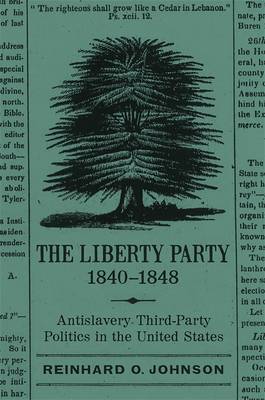
- Retrait gratuit dans votre magasin Club
- 7.000.000 titres dans notre catalogue
- Payer en toute sécurité
- Toujours un magasin près de chez vous
- Retrait gratuit dans votre magasin Club
- 7.000.0000 titres dans notre catalogue
- Payer en toute sécurité
- Toujours un magasin près de chez vous
The Liberty Party, 1840-1848
Antislavery Third-Party Politics in the United States
Reinhard O Johnson
76,45 €
+ 152 points
Format
Description
In early 1840, abolitionists founded the Liberty Party as a political outlet for their antislavery beliefs. A mere eight years later, bolstered by the increasing slavery debate and growing sectional conflict, the party had grown to challenge the two mainstream political factions in many areas. In The Liberty Party, 1840-1848, Reinhard O. Johnson provides the first comprehensive history of this short-lived but important third party, detailing how it helped to bring the antislavery movement to the forefront of American politics and became the central institutional vehicle in the fight against slavery.
As the major instrument of antislavery sentiment, the Liberty organization was more than a political party and included not only eligible voters but also disfranchised African Americans and women. Most party members held evangelical beliefs, and as Johnson relates, an intense religiosity permeated most of the group's activities. He discusses the party's founding and its national growth through the presidential election of 1844; its struggles to define itself amid serious internal disagreements over philosophy, strategy, and tactics in the ensuing years; and the reasons behind its decline and merger into the Free Soil coalition in 1848. Informative appendices include statewide results for all presidential and gubernatorial elections between 1840 and 1848, the Liberty Party's 1844 platform, and short biographies of every Liberty member mentioned in the main text. Epic in scope and encyclopedic in detail, The Liberty Party, 1840-1848 is an invaluable reference for anyone interested in nineteenth-century American politics.Spécifications
Parties prenantes
- Auteur(s) :
- Editeur:
Contenu
- Nombre de pages :
- 516
- Langue:
- Anglais
- Collection :
Caractéristiques
- EAN:
- 9780807175163
- Date de parution :
- 03-03-21
- Format:
- Livre broché
- Format numérique:
- Trade paperback (VS)
- Dimensions :
- 156 mm x 234 mm
- Poids :
- 789 g

Les avis
Nous publions uniquement les avis qui respectent les conditions requises. Consultez nos conditions pour les avis.






